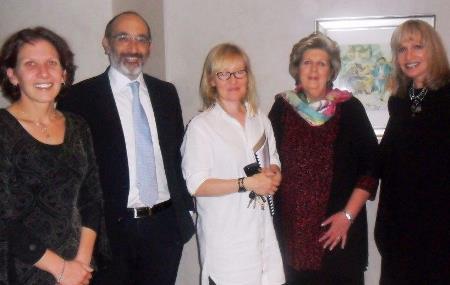SUZANNE BELLING
Lev Ari’s visit prompted the Co-ordinating Council of National Jewish Women’s Organisations of South Africa and the Judith Harrisberg Memorial Fund, to set up Shalom Bayit, followed by Koleinu (Our Voice), with Wendy Hendler and Rozanne Sack, and Kidsafe, established by Robyn Goldstein.

RIGHT: Speakers at the symposium on abuse: Yael Band; Chief Rabbi Warren Goldstein; Lisa Vetten; Brenda Solarsh; and Brenda Lasersohn PHOTO: SUZANNE BELLING
This brought about a new awareness when victims of abuse began to be believed and, apart from these organisations, the Chevrah Kadisha Community Services became involved in helping abused women, which included legal and financial help.
“The prize was belief,” Brenda Solarsh, Abuse Project developer, told a symposium on domestic violence at Sydenham-Highlands North Hebrew Congregation last week. Chairing the gathering Solarsh said there needed to be new initiatives – not only looking at partner abuse.
Yael Band, “representing every survivor of abuse”, told her poignant story, followed by one woman who admitted that three of her daughters had been raped over a long period by their father, her former husband.
From the age of five, Yael, now 38, was sexually abused for several years by a man living in her complex. This only stopped when her family moved away.
“My mother had told me not to have sexual relations before marriage and when I turned him down, he became physically violent. He made me feel ugly and fat and not worthy, even though I was head girl of my school. He appeared to be a perfect Jewish boy whom any Jewish mother would have wanted for her daughter.”
In her 20s Yael landed up in a psychiatric ward and later in rehabilitation for drugs, “a shande”.
Referring to her relationship with her boyfriend, she said: “I was so in love with him, I was scared he would dump me. Just for a few moments I was prepared to take it [the abuse] for love.
“Abuse changes your life forever and although I have made a miraculous recovery, I cannot be called a survivor, I’ve just learnt to live with it. It is always there.”
Lisa Vetten, a gender specialist, said that one in four women experienced abuse and half of this statistic was emotional abuse.
According to a joint study of the University of Cape Town and Johns Hopkins University in America, domestic violence was the greatest form of violence.
Referring to legal changes, Vetten said that in 1999 half of women murdered had been killed by their partners.
The 1993 Domestic Violence Act recognised marital rape. Abuse could be physical, emotional, sexual or economic.
One of the problems regarding conceptions of abuse was that men were regarded as the heads of households and protectors, while women were viewed as fragile.
Psychologist Brenda Lasersohn debunked the myth that the Jewish community was exempt from domestic violence. “The Jewish community mimics figures in the general population,” she said.
Mythology had it that women were the only victims and men were supposed to be big and strong. Women, too, could be abusive psychologically, verbally, economically and religiously. Abuse was not only confined to couples. Children were often abusive towards parents, especially if they were elderly or ill. They tried to exert power and control.
There was also the phenomenon of sibling abuse. “Many silences need to be broken,” Lasersohn said.
“To save a life is to save the world,” said Chief Rabbi Warren Goldstein, referring to a Talmudic precept. The question of abuse had to be viewed holistically and strategically, with the presence of key elements needed to succeed. Tackling the problem of abuse “really is about saving lives.
“The Jewish community must promote values which are antidotes to abuse.”
These included transparency and openness, ethics and respect for every human being and ethics and respect within a marriage.
“My policy is zero tolerance [to abuse],” he said.
He stressed the availability of organisations to help where abuse existed – Koleinu, Kidsafe, Shalom Bayit and also ORT-Jet, which gave economic empowerment to women, enabling them to leave an abusive relationship.
Rabbi Goldstein praised these organisations as well as Community Active Protection (CAP), which were there in emergencies.
Both rabbis and rebbetzens were training people in community activism.
Marcia Parness, a foundation member of Shalom Bayit, thanked members of the panel.
David
Apr 5, 2015 at 10:49 am
‘All strength to the Rebbetzens, because whether we believe it or not , they have the greater power of knowledge as well as intuition, to alert the authorities and the organisations who battle this criminal scourge.
It the Rebbetzens and the mothers within the community who ultimately can bring about the resultant action to be taken against the perpetrators, be they young or old, family or friend or otherwise . ‘
Victim
Apr 7, 2015 at 12:56 pm
‘So then why does the rabbi and the beth din secretly send abusers out of the country on one way tickets? It happens more often than you know.’